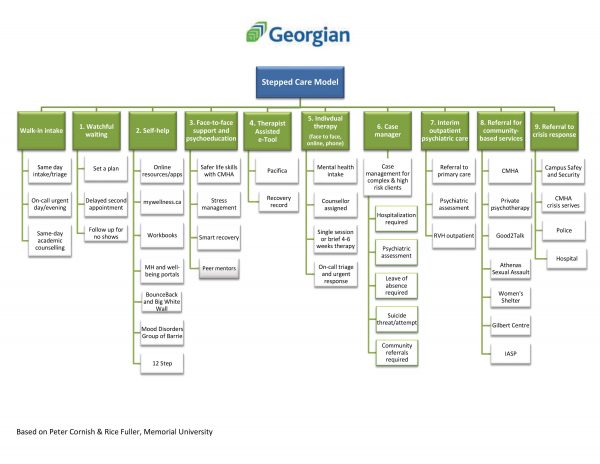Home Stepped Care 2.0 Toolkit Section 3: Case Studies The Case of Georgian College
The Case of Georgian College
The Process
- A formal implementation of Stepped Care began when Georgian College received funding through the Ontario government’s Mental Health Innovation Fund for two initiatives: Case Management Project (2013-15) and Case Management Project: Focus on Addictions and Transition (2015-17).
- Georgian College received funding for a part-time clinical case manager who was mentored by a case manager lead.
- Both the case manager lead and case manager developed new relationships and bolstered prior relationships with community partners (hospital in-patient and day programs, Canadian Mental Health Association, family service agencies and many more).
- Georgian College implemented walk-in and evening counselling services more than 10 years before implementation of the Case Management Project.
- In May 2018, Georgian College hired a mental health strategist responsible for developing a mental health strategy for both students and employees at all seven campuses.
- Collaboration with community partners is essential for Georgian College’s Stepped Care Model. The mental health team and mental health strategist work together to ensure these relationships thrive.
The Results
- Stronger connection between on-campus counselling services, other campus services and community-based services (e.g. co-facilitated Skills for Safer Living with Canadian Mental Health Association staff, greater communication between the college and hospitals, participation on various community agency committees, shared expertise and collaboration between the college and other agencies).
- Wait times for appointments continue to be minimal (within 24 hours).
- Counsellors at Georgian College were generally very supportive of the changes. This was partly because walk-in and evening hours for counselling had already been implemented for several years.
- Students are increasingly aware of the flexible and accessible services available to them. New mental health and well-being student portals were launched in May 2019 to ensure more students are aware of these services and resources.


